Book contents
- Frontmatter
- Contents
- Preface
- Chapter I Preliminary Results
- Chapter II The Uniqueness Theorem
- Chapter III Maximal Subgroups
- Chapter IV The Family of All Maximal Subgroups of G
- Appendix A Prerequisites and p-Stability
- Appendix B The Puig Subgroup
- Appendix C The Final Contradiction
- Appendix D CN-Groups of Odd Order
- Appendix E Further Results of Feit and Thompson
- Bibliography
- List of Symbols
- Index
Chapter III - Maximal Subgroups
Published online by Cambridge University Press: 04 May 2010
- Frontmatter
- Contents
- Preface
- Chapter I Preliminary Results
- Chapter II The Uniqueness Theorem
- Chapter III Maximal Subgroups
- Chapter IV The Family of All Maximal Subgroups of G
- Appendix A Prerequisites and p-Stability
- Appendix B The Puig Subgroup
- Appendix C The Final Contradiction
- Appendix D CN-Groups of Odd Order
- Appendix E Further Results of Feit and Thompson
- Bibliography
- List of Symbols
- Index
Summary
As mentioned in the preface, the proof of the Feit-Thompson Theorem is similar in broad outline to the proof for the special case of CN-groups. There, the CN-group hypothesis yields immediately that the maximal subgroups are Frobenius groups or “three step groups” under a definition different from our definition of three step groups (given in a remark before Proposition 16.1). In contrast, here we have no preliminary restrictions on a maximal subgroup M other than its being solvable. However, having proved the Uniqueness Theorem, we are able to show in fairly short order that M has p-length one for every prime p (Theorem 10.6). Eventually we show that either M is “of Frobenius type” (“almost” a Frobenius group), or M is a three step group (as defined in these notes) (Theorem I). (Incidently, we can obtain Burnside's paqb theorem for odd primes p and q very easily now, as shown in the remark after the proof of Theorem 10.2).
In this chapter we attain part of our final goal by focusing our attention on a single maximal subgroup M. We introduce two normal Hall subgroups Mα and Mσ of M and study their properties in Section 10. The subgroup Mσ plays a role analogous to that of the Fitting subgroup (i.e., the Frobenius kernel) in a Frobenius group. Indeed, if M is a Frobenius group, then Mσ = F(M) and r(M/Mσ) = 1. In Section 11 we study the structure of M under a particular restriction.
- Type
- Chapter
- Information
- Local Analysis for the Odd Order Theorem , pp. 69 - 104Publisher: Cambridge University PressPrint publication year: 1995



